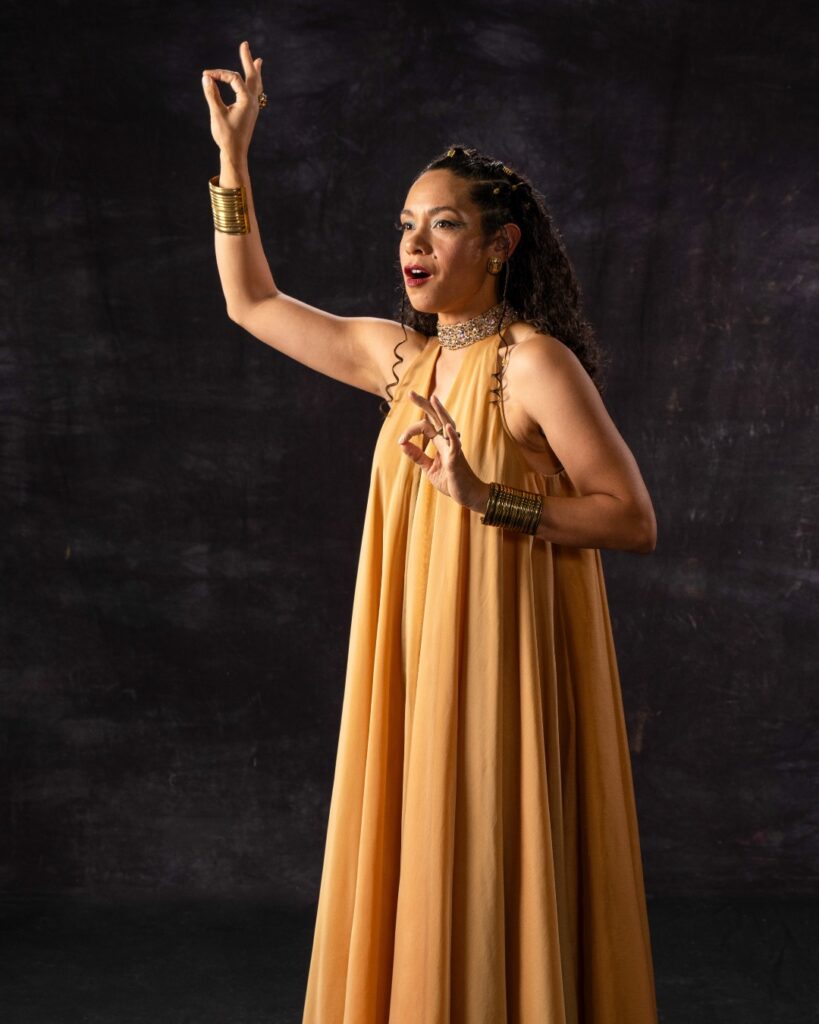By Jason and Alisha Hagey
Utah Shakespeare Festival’s Antony and Cleopatra is a play about contradictions: empire and intimacy, duty and desire, identity, and performance. This production resists every attempt to confine it to a specific meaning. William Shakespeare (Playwright) gives us a world in flux, where power is fragile, love is dangerous, and identity is constantly shifting, sometimes by choice, sometimes by force. They embrace these tensions through a postmodern lens. It’s a deliberate pastiche: fractured, layered, and full of purposeful anachronism. There are touches of ancient Rome and Egypt with echoes of modern politics, pop culture, and myth. They are not aiming for historical realism. They are staging a dream – sometimes a nightmare – made of symbols, archetypes, and spectacle.
This play doesn’t resolve easily, and Carolyn Howarth (Director) doesn’t try to make it neat. She leans into its dichotomies and lets them breathe. What results is not historical drama, but something stranger, closer to emotional truth than historical fact. Howarth doesn’t hand you sentiments but lets you find your way through the chaos. She unsettles you, draws you in, and leaves you thinking. Identity shifts and reshapes itself. Time feels loose, like it’s slipping in and out of focus. Love isn’t just love; it’s something staged, felt, and performed simultaneously. And death feels less like an end and more like a final, deliberate gesture.

Kathryn Tkel (Cleopatra) and Geoffrey Kent (Antony) are not just historical figures; they’re archetypes of power and passion, constantly posturing themselves for each other, their courts, and us. Their love is theatrical, and so is their downfall. In their world, gender, identity, and loyalty blur and morph. Both actors lean fully into that complexity. Tkel does so with a mercurial brilliance that commands the stage, and Kent has a haunted intensity that slowly unravels.
Supporting these two actors is an enumerable host of characters, too many to talk about all of them. The following are highlights of some of the most memorable personalities in this production.

Chris Mixom (Enobarbus) stands at the edge of Antony and Cleopatra: loyal, cynical, and clear-eyed in a world blurred by passion and performance. A Roman soldier with the soul of a poet, he offers perspective where others chase illusion. Mixom begins as the observer, not the hero, with dry wit and a drink continually in hand, but his arc is one of silent devastation. Mixom brings a grounded honesty to the role, never pushing for feeling, yet somehow evoking it in every glance and hesitation. When he finally leaves Antony, it’s not betrayal but heartbreak, ultimately destroying him. His death is unadorned and untheatrical. Mixom offers no flourish but only truth.
Played with striking precision, Cassandra Bissell (Agrippa) doesn’t seize attention with volume or bravado but with focus and control. She carefully calibrates every entrance, and each word lands with deliberate weight. Bissell plays Agrippa with a cool, strategic edge. No one dares question her authority, and the bold, gender-bent take on the traditionally gruff Roman general never loses its strength or clarity. She embodies a Rome that is less about domination and more about design.

Gabriel W. Elmore (Octavius Caesar) brings a chilling clarity to the role. Passion doesn’t carry Caesar away like Antony, and spectacle never shrouds him like it does Cleopatra; he remains the cool architect of empire. Elmore leans into that stillness, delivering each line without raising his voice to command a room. His Caesar is a figure of certain inevitability.
With steady, soulful, and unwavering devotion to Cleopatra, Alia Shakira (Charmain) brings steady brilliance to the role. Commentators often describe Charmian as a “minor” character in Antony and Cleopatra, but she’s anything but small. Shakira plays Charmain as the calm at the center of the storm. In the play’s final moments, Shakira transforms what could be a footnote into something transcendent, filled with loyalty and love.

The production unfolds with dreamlike intensity, where symbols carry more weight than facts. Lindsay Jones’ (Sound Designer/Original Music Composer) music fuses ancient rhythms with distorted modern beats and electric guitars. Seeking a timeless feel, Raven Ong’s (Costume Designer) costumes pull from across centuries but are never from any era or fully identifiable as a specific style. Shannon McKinney’s (Lighting Designer) lighting doesn’t just reflect mood – it creates, heightens, and distorts it. Each design element of the show reinforces Howarth’s postmodern vision.
The Utah Shakespeare Festival’s Antony and Cleopatra does not seek to package a historical narrative neatly. It invites audiences into a disorienting exploration of human nature. It carries a sense of purpose. Through its deliberate anachronisms and nuanced performances, it forgoes simple answers. It’s a production that values a grounded approach, which gives it a quiet strength that lingers.
Utah Shakespeare Festival presents Antony and Cleopatra by William Shakespeare
June 17 – September 5, 2025
195 W Center Street, Cedar City, Utah. 84720
Engelstad Shakespeare Theatre
Tickets: $25-$85
800-PLAYTIX or 866-962-9897
Ticket Office Hours:
Performance Days: 10 am-8 pm, with phone service ending at 7 pm
Non-performance Days: 10 am-5 pm, Monday through Saturday
Utah Shakespeare Festival
Utah Shakespeare Festival Antony and Cleopatra Site
Utah Shakespeare Festival Facebook
Utah Shakespeare Festival Instagram
Child/Student Discount
Children ages six to eighteen, and students of any age older than six with a valid student ID or proof of student status, can receive a discount of $10 off any ticket. This is available online or through the Ticket Office.
Content Advisory
This gripping tragedy explores complex and intense emotions and includes sexual puns and innuendos. Antony & Cleopatra explores themes of violence and warfare, suicide, mature romantic relationships, and colonialism.



0 Comments